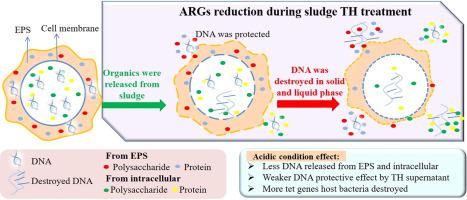Waste Management ( IF 7.1 ) Pub Date : 2021-02-15 , DOI: 10.1016/j.wasman.2021.01.019 Gang Xue , Ruqi Diao , Mingji Jiang , Hong Chen , Xin Yu , Jing Xie , Pin Gao , Xiang Li

|
Thermal hydrolysis (TH) treatment has been verified to effectively reduce antibiotic resistance genes (ARGs) in waste activated sludge. This study focused on the effect of TH parameters on ARGs reduction, and the optimal conditions basing on tetracycline (tet) resistance genes reduction rate in sludge phase were pH 3, temperature 160 °C and reaction time 2 h. The pH was found to play a critical role in tet genes reduction behavior. Additionally, the tet genes distributions in TH supernatant are considered as well because genes will release from solid to liquid phase as sludge cell breaking. The lowest genes content in TH supernatant was also observed at pH 3. Further investigation revealed that contents of DNA and organics released from sludge phase to liquid phase under pH 3 were less than that in neutral and alkaline condition; moreover, the organics in TH supernatant was found to protect DNA. Therefore, under the acidic condition, the genes had less releasing from the sludge phase and the DNA protection effect of organics was weaker, resulting in the lowest tet genes content in TH supernatant. Moreover, bacterial community structure after TH was closely related with the ARGs content. The bacterial on phylum and genus level showed various responses to TH pH values. Although the Firmicutes phylum and Escherichia-Shigella genus exhibited the stronger resistance and had higher accumulation in TH acidic condition, more possible total tet genes hosts were destroyed in acidic condition, causing less ARGs remaining in the sludge phase under pH 3.
中文翻译:

pH值对污泥热水解过程中四环素抗性基因减少的显著作用
热水解(TH)处理已被证实可有效减少废物活性污泥中的抗生素抗性基因(ARG)。本研究着眼于TH参数对ARGs还原的影响,基于四环素(tet)抗性基因在污泥相中还原速率的最佳条件为pH 3,温度160°C和反应时间2 h。发现pH在tet基因还原行为中起关键作用。另外,还考虑了TH上清液中的tet基因分布,因为随着污泥细胞的破裂,基因将从固相释放到液相。在pH值为3时,TH上清液中的基因含量最低。进一步的研究表明,pH值为3时,从污泥相向液相释放的DNA和有机物的含量低于中性和碱性条件下的含量。而且,发现TH上清液中的有机物可以保护DNA。因此,在酸性条件下,这些基因从污泥相中释放较少,而有机物的DNA保护作用较弱,从而导致TH上清液中的tet基因含量最低。此外,TH后细菌群落结构与ARGs含量密切相关。细菌在属和属水平上显示出对TH pH值的各种响应。尽管Firmicutes phylum和Escherichia-Shigella属在TH酸性条件下表现出较强的抗性和较高的积累,但在酸性条件下破坏了更多可能的总tet基因宿主,导致pH 3下污泥相中残留的ARGs减少。这些基因从污泥相中释放较少,有机物对DNA的保护作用较弱,导致TH上清液中tet基因含量最低。此外,TH后细菌群落结构与ARGs含量密切相关。细菌在属和属水平上显示出对TH pH值的各种响应。尽管Firmicutes phylum和Escherichia-Shigella属在TH酸性条件下表现出较强的抗性和较高的积累,但在酸性条件下破坏了更多可能的总tet基因宿主,导致pH 3下污泥相中残留的ARGs减少。这些基因从污泥相中释放较少,有机物对DNA的保护作用较弱,导致TH上清液中tet基因含量最低。此外,TH后细菌群落结构与ARGs含量密切相关。细菌在属和属水平上显示出对TH pH值的各种响应。尽管Firmicutes phylum和Escherichia-Shigella属在TH酸性条件下表现出较强的抗性和较高的积累,但在酸性条件下破坏了更多可能的总tet基因宿主,导致pH 3下污泥相中残留的ARGs减少。细菌在属和属水平上显示出对TH pH值的各种响应。尽管Firmicutes phylum和Escherichia-Shigella属在TH酸性条件下表现出较强的抗性和较高的积累,但在酸性条件下破坏了更多可能的总tet基因宿主,导致pH 3下污泥相中残留的ARGs减少。细菌在属和属水平上显示出对TH pH值的各种响应。尽管Firmicutes phylum和Escherichia-Shigella属在TH酸性条件下表现出较强的抗性和较高的积累,但在酸性条件下破坏了更多可能的总tet基因宿主,导致pH 3下污泥相中残留的ARGs减少。











































 京公网安备 11010802027423号
京公网安备 11010802027423号